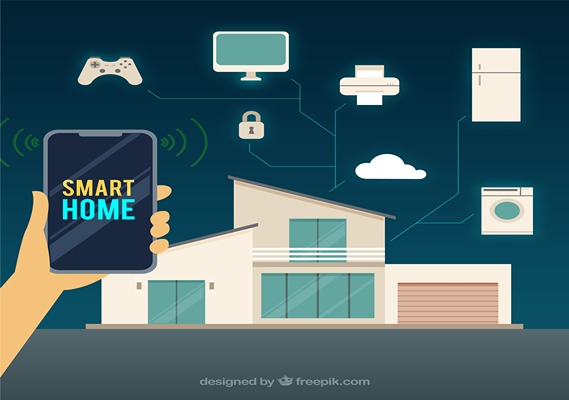As you step inside, the lights automatically turn on to your preferred brightness, your favorite playlist begins to play softly in the background, and the thermostat adjusts to your ideal temperature. This isn’t a scene from a sci-fi movie; it’s the reality of smart homes, thanks to the integration of Internet of Things (IoT) technology.
What is IoT?
The Internet of Things, commonly referred to as IoT, is a network of physical devices connected to the internet, all capable of collecting and sharing data. These devices range from everyday household items like refrigerators and light bulbs to complex industrial machines. In a smart home, IoT enables various devices to communicate with each other and with the homeowner, creating a seamless and intuitive living experience.
Key Components of a Smart Home
1. Smart Lighting: Smart bulbs and switches allow you to control your home’s lighting through your smartphone or voice commands. They can be programmed to turn on and off at specific times, change colors, or dim based on the time of day or your activities.
2. Thermostats: Smart thermostats learn your schedule and preferences to optimize your home’s heating and cooling systems. They can be controlled remotely and even use sensors to adjust temperatures in different rooms.
3. Security Systems: From smart locks to video doorbells and surveillance cameras, IoT has revolutionized home security. These devices provide real-time monitoring and alerts, giving homeowners peace of mind whether they’re at home or away.
4. Appliances: Modern smart appliances like refrigerators, washing machines, and ovens can be controlled via apps. They offer features like inventory management, maintenance alerts, and energy efficiency tracking.
5. Voice Assistants: Devices like Amazon Echo, Google Home, and Apple HomePod serve as the central hub for many smart home systems. They can control other smart devices, provide information, and even entertain with music and audiobooks.
Benefits of Smart Homes
1. Convenience: With IoT, managing your home becomes incredibly convenient. You can control multiple devices with a single app or voice command, automating routine tasks and freeing up time for more important activities.
2. Energy Efficiency: Smart devices help reduce energy consumption by optimizing the use of electricity, heating, and cooling. For example, smart thermostats can adjust temperatures based on when you’re home or away, and smart lighting can turn off automatically when no one is in the room.
3. Enhanced Security: IoT security systems provide robust protection against intrusions. With real-time alerts and remote monitoring, homeowners can quickly respond to potential threats.
4. Cost Savings: By improving energy efficiency and preventing damage (like alerting you to a potential water leak), smart home devices can lead to significant cost savings over time.
Challenges and Considerations
Despite the many benefits, there are also challenges associated with IoT integration in smart homes:
1. Privacy and Security: With increased connectivity comes the risk of cyberattacks
2. Compatibility: Not all smart devices are compatible with each other. It’s essential to choose products that can seamlessly integrate within your existing ecosystem.
3. Cost: Initial setup costs for a fully integrated smart home can be high. However, these costs are often offset by the long-term savings and convenience.
4. Complexity: For some, the idea of setting up and managing multiple smart devices can be daunting. However, many companies are working to simplify the user experience.
The Future of Smart Homes
As technology continues to advance, the integration of IoT in smart homes will become even more sophisticated. We can expect greater interoperability between devices, improved AI-driven personalization, and enhanced security features. The smart homes of the future will not only anticipate our needs but also adapt dynamically to our lifestyles, making our living spaces more comfortable, efficient, and secure than ever before.
In conclusion, the integration of IoT in smart homes offers a glimpse into a future where our living environments are more attuned to our needs than ever before. While there are challenges to address, the benefits of convenience, efficiency, and security make smart homes an exciting and rapidly evolving field.




